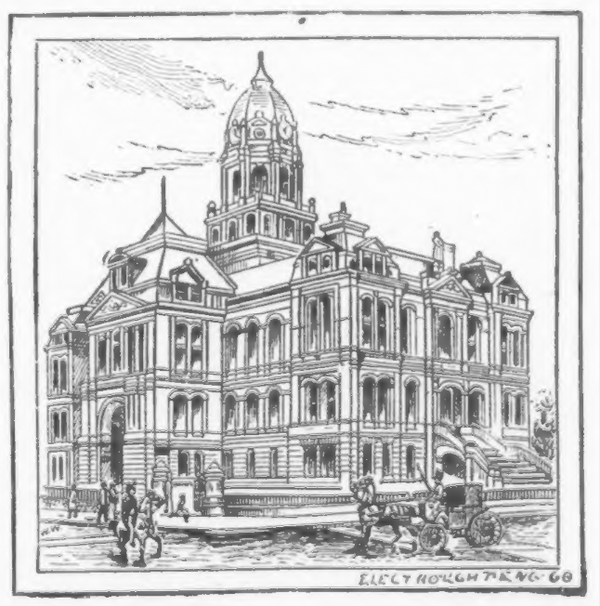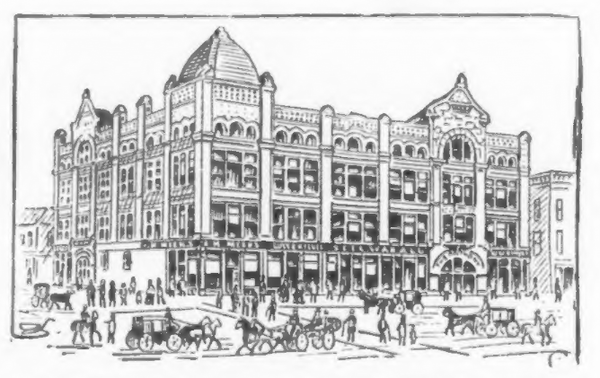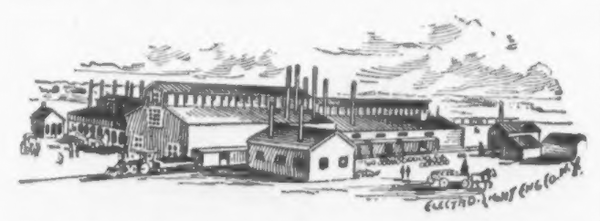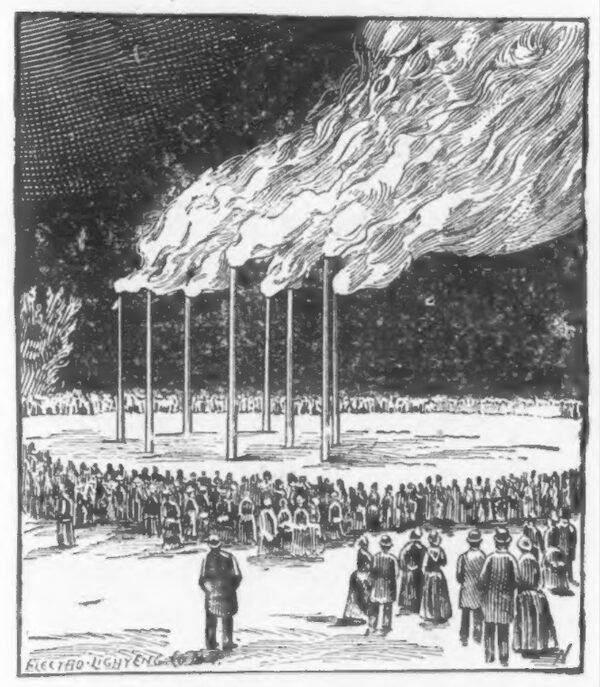[Newspaper]
Publication: Frank Leslie's Illustrated Newspaper
New York, NY, United States
vol. 68, no. 1755, p. 213, col. 1-4
MUNCIE, INDIANA.
THE NATURAL-GAS CITY OF THE WEST — ITS ADVANTAGES FOR THE
MANUFACTURER, MERCHANT, INVESTOR AND SPECULATOR — FREE FUEL
— FREE LIGHT — NATURAL BEAUTY — NATURAL ADVANTAGES AND
NATURAL GAS ARE CALLING CITIZENS OF THE WORLD TO THIS FAVORED CITY
— AN INVESTING FIELD FOR INVESTORS.
THE world is familiar with the phenomenally rapid growth of the West. In one brief generation we have looked in amazement at the flight of vast herds of buffalo and hordes of painted men before the advancing caravans of the emigrant. Seen the locomotive climb, chamois-like, over the cliffs and very crests of the Rocky Mountains. Seen a web of steel spread over the wilderness by the great spider of commerce. The tepees of the Indians swept away to make room for the factory, church and school-house.
Amid the roar of mill-wheels, the din of factory whistles and clatter of the wheels of trade, the people of the East have swept with their telescopes the far West for the glitter of gold, and the broad domain of the Hoosier State for fruits of agriculture alone.
One city at least in this State of golden groups of grain and great herds of cattle has caught the eye of the East, and the query comes, What new wonders has Nature’s store-house given to enrich, now fortunate, to be mighty, Muncie, the manufacturing city of the West?
It is the same that shoots from Nature’s boundless reservoirs, lighting up Muncie’s future with untold benefits, bringing costless fuel, and setting the wheels of a hundred factories in tuneful motion.
NATURAL GAS.
Its origin is shrouded in mystery. No man knows how it is made or from whence it comes. A well is sunk from 900 to 1,000 feet, and the Trenton limestone is struck; penetrating this rock a few feet, the gas comes gushing up with an almost irresistible force, and when lighted throws a terrific flame high in the air. Sometimes the volume of gas is so great that it is difficult to control, although this is now reduced to a science.
| |||
| NATURAL-GAS DISPLAY, MUNCIE, IND. |
Natural Gas is found only in a few favored localities of the world.
The Chinese discovered it two thousand years ago, and used it in their porcelain-furnaces. It is also found to some extent in Southern Russia.
In this country it fins been discovered in Pennsylvania, Ohio, and Muncie, Indiana. The latter is the largest field in the world, and manufacturers are now seeking this city of free fuel and splendid shipping facilities. The use of Natural Gas is but in its infancy. The world as yet has not realized how great and valuable are the Natural-gas fields, although capitalists are seeking every opportunity to invest, and in many cases are piping it fifty miles and more to some of our large cities.
Natural Gas is the king of fuels — the mighty spirit of heat. It comes as the latest and most wonderful gift of Nature to man.
The gold mountains of the Pacific; the mighty hematite vein that traces its iron way from New York through Alabama; the great black diamonds of the broad coal-fields of America, sink into insignificance when compared to Natural Gas.
MUNCIE, INDIANA.
Two years ago the glad tidings went forth that Natural Gas had been discovered at Muncie, then a thrifty county sent with 7,000 inhabitants, backed by a county of unusual richness and fertility of soil; but with the discovery of Natural Gas a new era dawned, and Muncie began to boom into prominence as a manufacturing city. Factory after factory came, attracted by the offer of free fuel and free land, until during the past eighteen months eighteen new factories have cast their fortunes with this charming city — which has grown from seven thousand to fourteen thousand within two years. Muncie has the finest court-house in the State outside the capital, a beautiful high-school building besides four others, twelve churches, five hotels, rows of brick and stone buildings, miles of brick and stone sidewalks, splendid water-works and sewerage system, paid fire department, and macadamized streets fringed with beautiful maple shade-trees.
Twenty splendidly graded and graveled turnpikes radiate from Muncie's centre, like the spokes of a wheel from its hub, forming charming drives and penetrating everywhere the wealth of agriculture. Historic White River, upon whose banks the Delaware and Miami Indians settled a century ago, forms a half-circle around the city. It was here that Tecumseh, that wily Indian chief, made his last stand and fought till overpowered by the hardy early pioneers, and was driven west across the Mississippi.
Thirty-three mighty Natural-gas wells, within a radius of two miles of Muncie's centre, pour forth 100,000,000 cubic feet of gas per day, only about one-third of which is now consumed. The amount of saving in fuel and light to Muncie's residents and manufactories now aggregates the enormous sum of $500,000 annually.
The supply is inexhaustible. Centre Township, six miles square, in the centre of which is located the City of Muncie, will supply gas in abundance for a thousand wells, or two billion cubic feet per day, enough for a manufacturing city of one million inhabitants. Taking these facts into considation [sic] consideration, who can anticipate Muncie's magnificent future? Conservative people estimate its population at 50,000 within five years; others, at 100,000. There has been no wild "boom" in real estate, and values are exceedingly low when compared with Western cities of less brilliant prospects. Prices have gradually advanced, and each year will now undoubtedly see an advance of from fifty to one hundred per cent, in real estate; especially will this be true of lands immediately adjoining the city.
MANUFACTURING INDUSTRIES.
Among the prominent and largest manufactories located here during the last eighteen months are the Muncie Nail and Iron Works, employing 350 hands, and saving $40,000 annually in fuel; Muncie Pulp Co., employing 250 hands, and saving $45,000 in fuel; Hemingray Glass Works, table-ware, 300 men, and saving $20,000 yearly in fuel; Maring, Hart & Co., window-glass, 250 men, and saving $15,000 in fuel; C. H. Over & Co., window-glass, 175 men, and saving $11,000 yearly in fuel; Ball Bros. & Co., fruit-jars, etc., 150 men, and saving $10,000 yearly in fuel. It is estimated that the fifty-four factories located here save annually $250,000 in fuel. What manufacturer using coal can hope to compete with these figures when fuel costs nothing? Mr. Darnell, President of the Muncie Nail and Iron Co., says he is making a nail out of pig-iron so much finer, by the use of Natural Gas, that experts cannot tell it from steel.
Window-glass made by Natural Gas is finer, clearer, and gets the preference in the market over that made by coal.
New manufactories are now being located in this beautiful and enterprising young city, and if it is fair to judge the future by what has been accomplished in the past, over fifty large establishments will locate here within two years.
SUPERIOR RAILROAD FACILITIES.
Muncie transportation facilities are perfect. Three great trunk lines cross here, offering an outlet to every point of the compass — the Cincinnati, Cleveland, Columbus and Indianapolis, or "Bee Line"; the Lake Erie and Western; and the Fort Wayne, Cincinnati and Louisville. The two former furnish through transportation east and west, and the latter, running north and south, crosses all the great trunk lines from the Atlantic to the Pacific Coast.
 |
| COURT-HOUSE, MUNCIE, IND. |
A belt line of railroad skirts the southern and eastern part of the city, and connects with the three lines of road, affording manufactories facilities for loading and unloading freight at the factory-door. Muncie is fortunate in being a central city. It is the centre of Centre Township, in the centre of Delaware County. It is a great railroad centre. It is the centre of the Indiana gas-fields, the most extensive in the known world, and marks the centre of population of the United States.
THE MUNCIE NATURAL-GAS LAND
IMPROVEMENT CO.
ORGANIZATION OF A LARGE COMPANY-CAPITAL
STOCK, $2,000,000.
The eagle eyes of Eastern capitalists are ever in search of a favorable field for investment. They scan each day the horizon of the world for new discoveries. The gorgeous flame that gushed from Muncie's wells soon attracted their attention, and an expert was sent to look over the field and make a report.
Suffice it to say that it was so favorable that steps were taken to secure all the desirable property possible, and a company was formed with a capital stock of $2,000,000, and the following officers elected:
Hon. LEON ABBETT, ex-Governor of New Jersey, President.
Mr. E. G. RIDEOUT, New, York, Vice-president and General Manager.
Mr. S. C. GOSHORN, Muncie, Ind., Secretary.
Mr. WM. HARRIS, Union City, Ind., Treasurer.
Mr. JAMES M. WOODS, New York, Assistant General Manager.
Mr. JAMES A. BISHOP, Cincinnati, O., Director.
Mr. NICHOLAS OHMER, Dayton, O., Director.
Mr. W. S. HALL, Findlay, O., Director.
 |
| ANTHONY BLOCK AND OFFICES OF THE MUNCIE NATURAL-GAS LAND IMPROVEMENT CO., MUNCIE, IND. |
The Company own and control nearly 2,000 acres of land in and adjoining the city, and the main streets run through it. The belt-line railroad also passes through the property, and street-cars will soon be running. Broad and beautiful avenues are being made, and the land has been laid out into house and business lots, factory-sites, and large sales are being made daily.
The Company is also taking steps to secure other valuable gas-lands, and will in time control thousands of acres of the most valuable and greatest money-producing lands in the world.
AN INVITING FIELD FOR CAPITALISTS.
No city in this great country of ours is attracting so much attention, or presents such splendid opportunities for capitalists and investors, as does Muncie to-day.
Property is literally dirt-cheap when the fact is considered that the conditions are ripe for a phenomenally rapid advance in prices. The contractor and builder is here presented with a field which has seldom been equaled. A house a day is the record of building the past year, and yet there are required three hundred to meet the demands of tenants, and it is estimated that at least 1,500 will be built during the coming year.
The purchase of lots and building of houses for rent will pay a net profit of from 20 to 25 per cent, annually, and they can be rented as fast as built.
THE REAL-ESTATE INVESTOR AND SPECULATOR.
It is an admitted fact that more money is made in real estate than any other one thing in the world. The real estate of the earth is its mightiest wealth. Go read the records and history of New York, Boston, Chicago, St. Paul, Minneapolis, Duluth, Kansas City, Wichita, Denver and Birmingham. Substantial and rapid fortunes have been made in these places, as if by the touch of a magician's wand.
Property in these cities (and hundreds of others which might be mentioned) has advanced five hundred to two thousand per cent. History repeats itself, and Muncie of to-day offers as great and grand possibilities as did any of these cities.
PROSPECTIVE PROFITS.
Capital does not seek employment until it is assured that its investment is of a substantial and safe character. It must also be reasonably certain of fair remuneration.
Capitalists of the age in which we now live are more progressive, more enterprising, and have a broader field for operation, than the past. Gigantic enterprises are the order of the day, and capital is ever ready to grasp that which promises to pay largest dividends.
This Company has a field of unlimited possibilities. It is in the hands of men who, while conservative from a financial stand-point, are quick to grasp a situation and able to control it with a master-hand.
The Company intends to employ $500,000 of its capital in building houses and supplying gas to consumers, believing that this amount so employed will pay twenty-five percent. upon the investment.
ESTIMATED VALUE OF THE COMPANY’S LAND.
Good judges estimate the value of the Company’s lands to sell out in house and business lots at $4,000,000. This is not based upon any fictitious price or prospective value, but upon the prices at which it will sell and is selling at to-day.
 |
| MUNCIE NAIL AND IRON CO. MANUFACTORY. |
No account of the value of the inexhaustible and untold wealth of Natural Gas which underlies this land is taken into consideration, and it would be difficult to compute it. This Company has values and resources which should make it worth $10,000,000, and that at no distant day.
STOCK OF THE COMPANY.
The Company offers two propositions to investors: First, stock in the Company; Second, house and business lots of the Company.
The capital stock of the Company is $2,000,000, divided into 20,000 shares, par value $100 per share. Of the original $2,000,000, $1,584,060 has already been subscribed and paid for by Eastern and Western capitalists. Of the remaining $416,000, a portion is offered on subscription, for a short time, at $65 per share, after which the price will be advanced to $75. This is the lowest figure at which the stock has ever been offered or sold, and the company are sanguine beyond all doubt that this stock will command par within ninety days.
All stock is issued full paid and nonassessable.
By the investment of $500,000 of its capital in building improvements and supplying gas to consumers, the Company can pay an annual dividend of 6 per cent, upon its entire capital stock, leaving money received from the sale of lots for the payment of extra dividends. Extra dividends will be paid until purchasers have received the amount of $100 for each share of stock held by them. The sale of lots the first day they were offered amounted to $11,000.
The sale of lots ought to increase the annual dividend at least 25 per cent., and the Company believe they will be able to pay back the original investment of stockholders within two years, and still have a splendid dividend-paying property left.
The Company respectfully refer to appended letters. Should there be an excess of subscription, those of latest date will be rejected:
CLERK’S OFFICE, DELAWARE CO.,
MUNCIE, IND., March 27th, 1889.
DEAR SIR: I have been a resident of the City of Muncie for several years past, and am well acquainted with the people, its past history and future prospects. Its rapid increase in population, wealth and manufacturing industries bespeak for it a grand future. It in the best city in the Indiana gas-fields. Property here has rapidly increased in value owing to the great interest the public have manifested in Natural Gas and its possibilities. I am acquainted with the property owned by the Muncie Natural-gas Land Improvement Co. It is good property, and cannot fail to be profitable to its owners and investors. I am personally acquainted with many of the officers and men connected with said Company, and know them to be men of integrity and financial standing.
Respectfully, O. J. LOTZ.
Judge of Circuit Court.
CITY OF MUNCIE, INDIANA.
Mayor’s Office, March 27th, 1889.
DEAR SIR: I have a personal acquaintance with several of the officers and members of the Muncie Natural-gas Land Improvement Company, and regard them as men of integrity and financial ability; they have a good financial standing here.
I have lived here all my life, and have seen this city’s advancement and growth from a small village. Muncie is well located in a good agricultural region; has excellent railroad facilities, and an abundant supply of Natural Gas.
The real estate owned by said Company here is good and well located, and certain to advance greatly in value. There is every reason to believe, and no reason to doubt, that investments in the stock and in the lots of said Company will very soon prove to be very profitable.
Yours, respectfully, FRANK ELLIS,
Mayor of the City of Muncie, Ind.
A SAFE AND PROFITABLE INVESTMENT.
Nothing can be more safe, solid and substantial than an investment in Muncie. whether it be in house or business lots or stock of the Company. Loss is impossible, and the prospect of large and certain profit is all that the most careful and conservative could ask for.
The indications arc that the advertisements of Muncie’s advantages, the locating of factories and improvements upon the Company’s property, will give it one of the biggest booms known in the history of cities, and from one hundred to one thousand per cent, will be made by those who arc fortunate enough to invest early.
Savings-banks and insurance companies may fail, bonds depreciate and rail road-stock become worthless, but an investment in real estate in the staple and secure soil of mother earth is as permanent and lasting as time.
Here the rich capitalist can invest his tens of thousands; the thrifty merchant, mechanic or farmer, his thousands; and the laborer, his hundreds, with the absolute certainty of large and remunerative profits.
PRICE OF LOTS.
No price on residence or business lots can be given that will hold good for any length of time, but the Company is now selling desirable business and house lots at from $200 to $700. Size of lots are 40 x 125 to 50 x 125.
These prices are subject to advance without notice. Sale of lots the first day they were offered reached $11,000. Early purchasers will secure the profit made by any advance of prices by the Company.
A beautifully illustrated pamphlet, giving the history and development of Natural Gas, a description of Muncie past and present, its manufacturing industries, natural advantages and brilliant prospects, will be forwarded upon application, together with plat of the Company’s lands, maps, price list, etc.
The Company would be glad to secure reliable, representative men in all cities and towns to represent them.
Full particulars, pamphlets, terms, etc., can be had by calling upon or addressing the
MUNCIE NATURAL-GAS LAND IMPROVEMENT CO.,
Rooms 81 and 82,
45 BROADWAY, NEW YORK; OR MUNCIE, INDIANA

